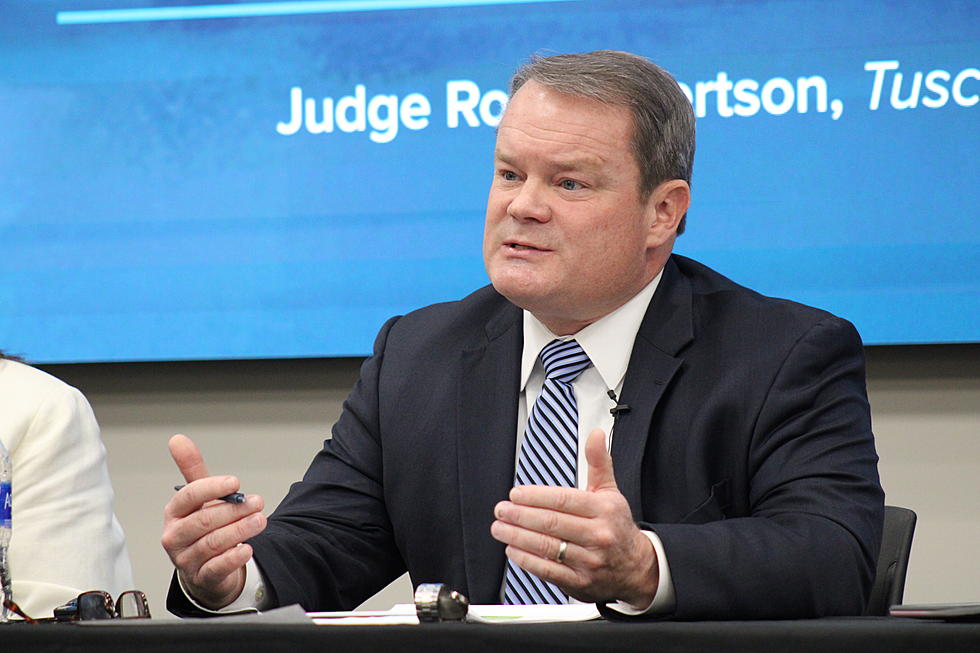
Infrastructure Issues Often Overlooked But Critical, Tuscaloosa Area Leaders Say
Growth in and around Tuscaloosa is creating new infrastructure issues and exacerbating existing ones, leaders from all over the area said in a discussion Wednesday afternoon.
The conversation was the third event in the Chamber of Commerce of West Alabama's Next Level Series — seven different public forums scheduled between now and early April that seek to examine all aspects of life in the Tuscaloosa area through discussions with top leaders from the public, private and non-profit sectors.
Wednesday's discussion was moderated by Probate Judge Rob Robertson, who also serves as the chairman of the Tuscaloosa County Commission, and its panel featured experts from the county, the city of Tuscaloosa, Northport, the Alabama Department of Transportation, the Tuscaloosa County Economic Development Authority and the Tuscaloosa County Road Improvement Commission.
In kicking off the conversation, Robertson said discussions about infrastructure can be boring and technical and it's hard to make people care about the subject until something goes wrong with their roads, bridges, sewer lines or broadband internet.
"We have limited resources, so where do we need to invest those dollars? I think that's the challenge that all the jurisdictions, the county, the cities and the state look at," Robertson said. "How do we get maximum impact for the community with the dollars we have to work with? It's a challenge, because there's always more need than money to go around, and when you build it, you've got to maintain it."
Issues in our area are also made more challenging by all its intersecting jurisdictions. Three nearby roads or highways may be the jurisdictional responsibility of three different entities. The state, the cities of Tuscaloosa and Northport and the county all maintain some roads, and fixing problems, adding features and planning work that makes sense logistically is often a team effort moving at the speed of government.

Perhaps the key takeaway from Wednesday's infrastructure conversation was just how much work it is to plan, build, replace and maintain critical infrastructure in the area.
In previous Next Level Series talks, panelists introduced themselves, talked about their professions and the challenges they faced then fielded questions from a moderator and from the audience if time allowed.
By the time each panelist introduced themselves and highlighted the projects with which they are involved, the 90-minute discussion was already coming to a close.
County Engineer Scott Anders said his department alone maintains 1,600 miles of roads and 210 bridges in addition to receiving and processing dozens of small-scale work orders from residents of the county's unincorporated spaces.
Jarrod Milligan, the city of Tuscaloosa's Executive Director of Infrastructure and Public Services, said a large portion of his department's work is the management of the city's water and sewer systems. Milligan said Tuscaloosa and Northport and some of the only cities in the state that own and operate their own wastewater treatment systems.
Glenda Webb, the city administrator in Northport, said her city's biggest issue is its explosive growth. Census numbers show the city's population grew by more than 30 percent in the last 10 years, and Webb said even that data is does not include several new subdivisions that are planned, under construction or very recently completed.
David Kemp from ALDOT, who joked he is always looking for a new place to put orange barrels, highlighted several ongoing and planned state projects that the Thread will break out in further detail in future stories.
Kelly Johns talked about the Tuscaloosa County Road Improvement Commission, which does not actually oversee road work but has financed more than $33 million in new projects around the county since it was created in 2015.
Finally, Max Snyder from the TCEDA discussed the growing need for fast, affordable and widespread access to broadband internet in the region.
The Next Level Series continues Wednesday at the C.A. Fredd Campus of Shelton State Community College, when experts will discuss the workforce barriers of childcare, housing, and transportation.
After the last meeting in April, the Series will culminate with the Next Level Summit, where the Chamber will take everything learned in these talks, combine it with the lessons learned on its out-of-state Benchmarking trips and formulate the shape of its five-year plan for the future.
Stay connected to the Tuscaloosa Thread for updates on the Series and Summit as they occur.
Top Stories From the Tuscaloosa Thread (2/21-2/27)
More From Tuscaloosa Thread









